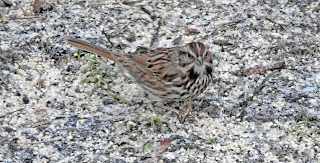NATURE MONCTON INFORMATION LINE, January
3, 2021 (Sunday)
To respond by e-mail, please address
your message to the information line editor, nelsonpoirier435@gmail.com .
Please advise the editor at nelsonpoirier435@gmail.com if any
errors are noted in wording or photo labelling.
For more information on Nature Moncton, check the website at www.naturemoncton.com .
Edited by: Nelson Poirier nelsonpoirier435@gmail.com
Transcript by: Louise Nichols nicholsl@eastlink.ca
Info Line # 506-384-6397 (384-NEWS)
** On Oct. 19th, a BlogSpot
post was made by Pat McLaughlin of getting very clear observations of a Cougar
in the Sussex area near the Kennebecasis River.
No further sightings were reported that I am aware of until Mike Paulin
reported a very credible observation on Dec. 29th of a COUGAR [Couguar] between the Fundy National Park exit
and Sussex. Mike commutes to work
between Moncton and Saint John, and on the morning of Dec. 29th
around 4:15 AM, he was between the Fundy Park exit and Sussex. About 300 to 400 ft ahead, he caught sight of
a large animal bounding towards the highway from the woods. He started breaking and was expecting the
standard White-tailed Deer, but as it came into the headlights, it was clearly
not, and he was shocked. It was a large
cat, cream-coloured, long and low, on the size scale of a deer or small Black
Bear. It seemed equally shocked and did
a 180 back toward the woods. It must
have covered 50 ft in two leaps. He
pulled up and stopped where he had seen it and noticed this section of the highway
had wildlife fencing. There was no sign
of it. It clearly had jumped over the
fence. Mike has spent a lot of time in
the woods in New Brunswick and elsewhere and has seen all the usual suspects of
bear, lynx, coyote, wolves in B.C., etc.
He has always heard the rumours of cougars in New Brunswick but never
put much thought towards it. It’s very
clear to him now it’s not just a rumour.
Both Mike Paulin and Pat McLaughlin will be submitting cougar report
forms to the New Brunswick museum for archiving. These animals of course can cover a huge
territory, but folks should take note in that area.
** Ronda and Paul Langelaan were
birding in the Harvey area of Albert County on Saturday morning to get some
striking photos of a BARRED OWL [Chouette rayée] very politely perched on a post.
** John Massey sent a photo yesterday
of a WHITE-TAILED
DEER [Cerf de Virginie] with head
lesions that Richard Blacquiere recognized after consulting with a similar
observation with Joe Kennedy, DNR deer biologist. The lesions are actually cutaneous fibromas
and are commonly called ‘deer warts’ by hunters who encounter them. The lesions are caused by a virus that tends
to be self-limiting and usually disappear on their own. It is usually not a serious condition to the
deer unless it affects foraging, but it’s cosmetically somewhat unappealing.
** Carol Shea got a surprise on
Saturday when an OVENBIRD [Paruline couronnée] appeared in her Upham feeder yard. Carol was able to get positive documentary
photos in spite of blowing snow and dark conditions. Her husband Allan got a photo of an intruder
looking into their basement window recently – a Snowshoe Hare, of course in
white camo.
** Lynda Leclerc reports there is some BEAVERS [Castor] working very hard to dam up the
Humphrey Brook beside the Harrisville trail entrance. One of the trees that they felled was
huge. Lynda comments that she has never
seen a tree that large tackled by a beaver.
They are working on several more trees and have already brought down
many. Lynda suspects the City of Moncton
will have to interfere with their building project before it floods the
trail. Lynda comments that the beavers
sure do work fast!
** Lois Budd reports she had her first COMMON REDPOLLS [Sizerin
flammé] drop by
her near Salisbury feeder yard on Dec. 31st, but on Saturday with
the snowstorm, they seemed everywhere in her feeder yard as well as a swelling
of the expected regulars.
** Most folks that have had the flush
of NORTHERN
CARDINALS [Cardinal rouge] recently in northeast New Brunswick report that they favour
ground foraging. This has been the case
for the pair patronizing our Moncton feeder yard. I had put a blend of black-oil sunflower
seed, sunflower hearts, cracked corn and white millet in a ground tray that
they had been going into. I had read
reports that they have a taste for white millet. That seemed apparently correct when I spotted
the male at a hanging millet feeder actively feeding on Saturday. I am also attaching a photo of a SONG SPARROW [Bruant
chanteur] in our
yard on Saturday that really shows the variability of the plumage of this
species. This specimen was very dark,
heavily streaked and showing pronounced rust tones. One can see the grey culmen
(ridge on top of the upper mandible) as well.
Nelson Poirier,
Nature Moncton












